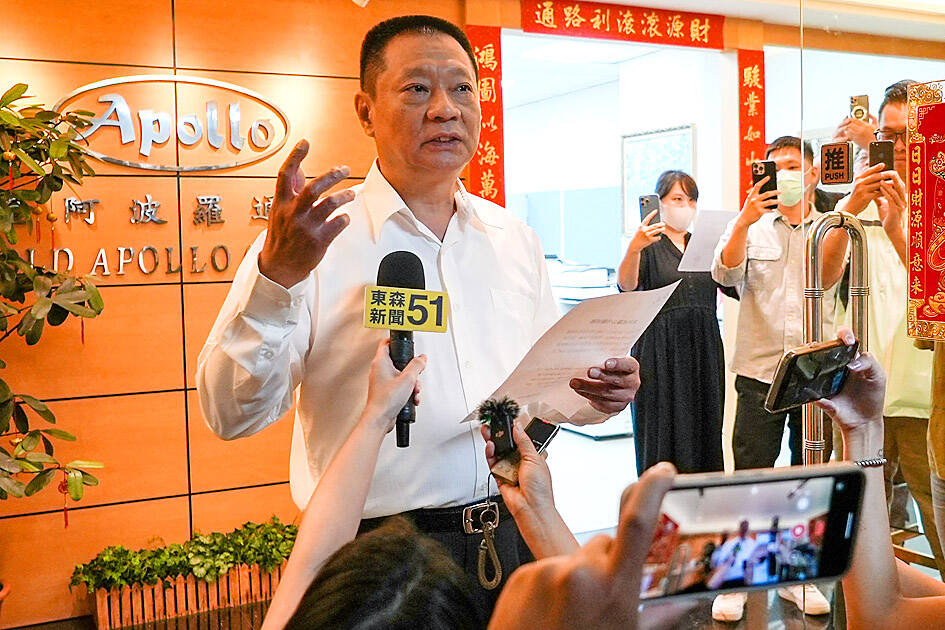Taiwanese firm Gold Apollo Co (金阿波羅通信) yesterday said that it authorized its brand on the pagers that exploded in Lebanon and Syria, but that another company based in Budapest manufactured them.
The pagers were manufactured by BAC Consulting KFT, based in Hungary’s capital, Gold Apollo said in a statement.
The company said the AR-924 pagers used by the Hezbollah militant group were produced and sold by BAC, which was authorized to use Gold Apollo’s trademark in some regions.

Photo: Yan Zhao, AFP
“We only provide brand trademark authorization and have no involvement in the design or manufacturing of this product,” it said.
“The product was not ours. It was only that it had our brand on it,” Gold Apollo founder Hsu Ching-kuang (許清光) said, adding that his company has had an authorization agreement with BAC for the past three years.
BAC has “cooperated with us and represents many of our products,” he said.
“We are a responsible company. This is very embarrassing,” he said, adding that the company was also a victim of the incident.
The Shilin District Prosecutors’ Office yesterday said that its national security division would launch an investigation into the case.
Gold Apollo had no record of directly exporting its products to Lebanon over the past few years, the Ministry of Economic Affairs said.
Products manufactured by Gold Apollo in Taiwan are mainly exported to Europe and North America, the ministry said.
The pagers made in Taiwan are only capable of receiving signals and use AA batteries, which are unlikely to cause fatal explosions, the ministry cited the company as saying.
The company exported about 260,000 pagers from 2022 to last month and 40,929 units in the first eight months of this year, ministry data showed.
Meanwhile, the National Communications Commission said that Gold Apollo’s business license to manufacture and sell radio frequency (RF) devices expired last year.
The Administrative Regulations on the Controlled Telecommunications Radio Frequency Devices (電信管制射頻器材管理辦法) require those seeking to import, sell, produce or display radio frequency devices in the nation must secure a certificate from the commission, the regulator said.
However, pagers are receivers of messages and are not controlled telecommunications RF devices, and such producers need not obtain a certificate, it said.
Manufacturers who sell RF devices to other countries should comply with the regulations in the target nations, it added.
A telecom expert who chose to remain anonymous told the Taipei Times it is surprising that such a small device can be used as a deadly weapon.
“The battery of a pager is much smaller than that of a smartphone and has limited energy storage capacity, so it is quite difficult to kill someone with a pager battery explosion,” the expert said.
A pager is not as tightly assembled as a mobile phone, which makes pagers easy to modify, the expert said.
“My guess is that explosive substances and denotation control mechanisms were added to the pagers before they were in the hands of users,” the expert said.
“It is very likely that the pager’s vibration function for incoming messages was used as part of the denotation control mechanism and a special incoming message command triggered the detonation,” they said.

A magnitude 5.6 earthquake struck off the coast of Yilan County at 12:37pm today, with clear shaking felt across much of northern Taiwan. There were no immediate reports of damage. The epicenter of the quake was 16.9km east-southeast of Yilan County Hall offshore at a depth of 66.8km, Central Weather Administration (CWA) data showed. The maximum intensity registered at a 4 in Yilan County’s Nanao Township (南澳) on Taiwan’s seven-tier scale. Other parts of Yilan, as well as certain areas of Hualien County, Taipei, New Taipei City, Taoyuan, Hsinchu County, Taichung and Miaoli County, recorded intensities of 3. Residents of Yilan County and Taipei received

Taiwan has secured another breakthrough in fruit exports, with jujubes, dragon fruit and lychees approved for shipment to the EU, the Ministry of Agriculture said yesterday. The Animal and Plant Health Inspection Agency on Thursday received formal notification of the approval from the EU, the ministry said, adding that the decision was expected to expand Taiwanese fruit producers’ access to high-end European markets. Taiwan exported 126 tonnes of lychees last year, valued at US$1.48 million, with Japan accounting for 102 tonnes. Other export destinations included New Zealand, Hong Kong, the US and Australia, ministry data showed. Jujube exports totaled 103 tonnes, valued at

TRUST: The KMT said it respected the US’ timing and considerations, and hoped it would continue to honor its commitments to helping Taiwan bolster its defenses and deterrence US President Donald Trump is delaying a multibillion-dollar arms sale to Taiwan to ensure his visit to Beijing is successful, a New York Times report said. The weapons sales package has stalled in the US Department of State, the report said, citing US officials it did not identify. The White House has told agencies not to push forward ahead of Trump’s meeting with Chinese President Xi Jinping (習近平), it said. The two last month held a phone call to discuss trade and geopolitical flashpoints ahead of the summit. Xi raised the Taiwan issue and urged the US to handle arms sales to

BIG SPENDERS: Foreign investors bought the most Taiwan equities since 2005, signaling confidence that an AI boom would continue to benefit chipmakers Taiwan Semiconductor Manufacturing Co’s (TSMC, 台積電) market capitalization swelled to US$2 trillion for the first time following a 4.25 percent rally in its American depositary receipts (ADR) overnight, putting the world’s biggest contract chipmaker sixth on the list of the world’s biggest companies by market capitalization, just behind Amazon.com Inc. The site CompaniesMarketcap.com ranked TSMC ahead of Saudi Aramco and Meta Platforms Inc. The Taiwanese company’s ADRs on Tuesday surged to US$385.75 on the New York Stock Exchange, as strong demand for artificial intelligence (AI) applications led to chip supply constraints and boost revenue growth to record-breaking levels. Each TSMC ADR represents